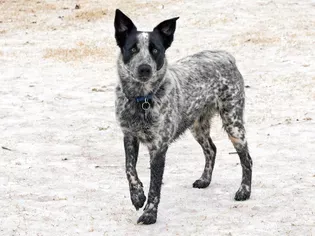Texas Heeler: Dog Breed Characteristics & Care
Updated on 05/26/24

The Texas Heeler: A Comprehensive Guide to This Energetic and Loyal Companion
Introduction
Get ready to embark on an in-depth exploration of the captivating Texas Heeler, a breed that combines the agility of the Australian Cattle Dog with the loyalty of the Australian Shepherd. With its striking appearance and energetic personality, this versatile companion is making waves in the canine world. In this comprehensive guide, we will delve into the unique characteristics, temperament, care requirements, and training tips that will help you navigate the wonderful journey of owning a Texas Heeler.
Defining the Texas Heeler: A Blend of Herding Instincts and Unwavering Loyalty
The Texas Heeler is a relatively new breed, tracing its origins to the late 1970s, when breeders in Texas sought to create a herding dog with a smaller frame and a more approachable temperament than its Australian Cattle Dog forebears. The result is a dog that retains the herding instincts of its ancestors while possessing a strong affinity for companionship, making it an ideal choice for active families and individuals.
Physical Attributes: A Sturdy Frame with Eye-Catching Markings
Texas Heelers are medium-sized dogs, typically standing between 17-20 inches tall and weighing 30-45 pounds. Their athletic build reflects their herding heritage, with a muscular frame and a tail that is often carried low. The breed's striking coat comes in a variety of colors, including blue heeler, red heeler, and black heeler, with distinctive white markings that give them their signature "tuxedo" appearance.
Temperament: A Loyal Companion with a Playful Spirit
The Texas Heeler's temperament is a testament to its dual heritage. It inherits the loyalty and protectiveness of the Australian Shepherd and the herding instincts and independence of the Australian Cattle Dog. This combination results in a dog that is deeply devoted to its family, eager to please, and always up for an adventure. Despite their working background, Texas Heelers are known for their affectionate and playful nature, making them excellent companions for children and adults alike.
Care Requirements: Nurturing an Active and Healthy Companion
Like any breed, the Texas Heeler has specific care requirements to ensure its well-being and longevity. Here are the key aspects to consider:
1. Exercise: As an active breed, the Texas Heeler needs plenty of daily exercise to stay physically and mentally stimulated. Long walks, runs, or interactive play sessions are essential for maintaining their health and preventing boredom, which can lead to destructive behaviors.
2. Diet: A balanced diet is crucial for the Texas Heeler's overall health. High-quality kibble formulated for active breeds is a good starting point, but you can also incorporate fresh fruits, vegetables, and lean meats to provide a well-rounded nutritional intake.
3. Grooming: The Texas Heeler's coat is relatively low-maintenance, requiring occasional brushing to remove dead hair and keep it looking its best. Regular nail trims and ear cleaning are also important for their hygiene.
4. Health: Texas Heelers are generally healthy dogs, but like all breeds, they are prone to certain health conditions. Hip dysplasia, elbow dysplasia, and eye diseases are some potential health concerns that owners should be aware of. Regular veterinary checkups and early detection are key to managing these conditions.
Training: Unleashing the Texas Heeler's Intelligence and Eagerness
The Texas Heeler's intelligence and eagerness to please make training a rewarding experience. However, their herding instincts can sometimes lead to nipping or chasing behavior, which requires consistent training and socialization. Here are some key training tips:
1. Start Early: Early socialization and training are crucial for shaping the Texas Heeler's behavior and preventing unwanted habits. Expose your puppy to different people, places, and experiences to build their confidence and adaptability.
2. Positive Reinforcement: Reward-based training methods are highly effective with Texas Heelers. Use treats, praise, and play to reinforce desired behaviors, while avoiding punishment, which can damage the bond between you and your dog.
3. Consistency: Consistency is key in training. Establish clear rules and boundaries, and enforce them consistently to help your Texas Heeler understand what is expected of them.
Examples of the Texas Heeler's Versatility: A Dog for Work and Play
The Texas Heeler's versatility shines through in various activities, showcasing their adaptability and eagerness to work:
1. Herding: The Texas Heeler retains the herding instincts of its ancestors, making it an excellent choice for herding livestock. Their agility and responsiveness make them ideal for this demanding task.
2. Agility: Texas Heelers excel in agility competitions, where their speed, agility, and ability to navigate obstacles are put to the test. Their intelligence and eagerness to please make them quick learners in this exciting sport.
3. Companionship: Above all else, the Texas Heeler is a loyal and affectionate companion. They thrive on human interaction and are always eager to cuddle, play, or simply be by your side.
Conclusion: Embracing the Texas Heeler's Extraordinary Spirit
The Texas Heeler is a remarkable breed that combines the best qualities of its herding and companion heritage. With its energetic personality, eye-catching appearance, and unwavering loyalty, the Texas Heeler is a true gem in the canine world. By understanding their unique characteristics and providing them with appropriate care and training, you can form an unbreakable bond with this exceptional companion. Embrace the Texas Heeler's extraordinary spirit, and embark on a journey filled with adventure, laughter, and unwavering companionship.
Explore More Pets

Basic Training
Puppy and Baby Introductions

Working Dog Breeds
All About Search and Rescue Dogs

Dog Treatments
Puppy Vaginitis: Signs, Causes and Treatment

Dog Adoption
After More Than 1,200 Days in the Shelter, Coco Goes Home

Basic Training
How to Train Your Puppy to Go on Potty Pads

Hybrid Dog Breeds
The Difference Between a Mutt, Mixed Breed, or Designer Dog?

Dog Treatments
Nail Problems in Dogs

Puppies
7 Reasons Why Two Dogs Are Better Than One
